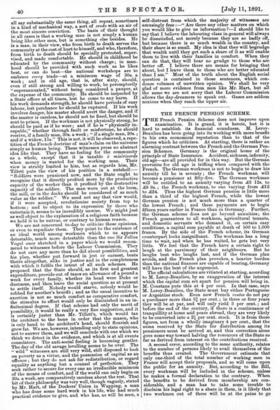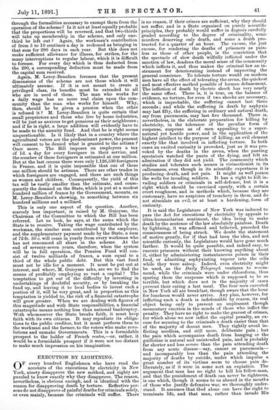THE FRENCH PENSION SCHEME. T HE French Pension Scheme does not
improve upon examination. It is grand, it is heroic, but it is hard to establish its financial soundness. M. Leroy- Beaulieu has been going into its working with more benefit to his own economical reputation than to that of the figures which he criticises. At starting, there is rather an alarming contrast between the French and the German Pen- sion Schemes. Germany is the original home of the principle of State Insurance. Accident, sickness, infirmity, old age—are all provided for in this way. But the German provision for old age is trifling when compared with the French. The German workman is not to begin to draw his annuity till he is seventy ; the French workman will become a pensioner at fifty-five. The German workman will be entitled to an annuity varying from £3 12s. to £8 8s. ; the French workman, to one varying from £12 to £24. Thus the highest German pension is little more than a third of the highest French, while the lowest German pension is not much more than a quarter of the lowest French ; and these payments are to begin fifteen years earlier in France than in Germany. Further, the German scheme does not go beyond annuities ; the French guarantees to all workmen, agricultural tenants, and domestic servants who demand it, on certain easy conditions, a capital sum payable at death of 500 to 1,000 francs. By the side of the French scheme, its German counterpart looks insignificant. The workman has a long time to wait, and when he has waited, he gets but very little. We feel that the French have a certain right to laugh at the parsimony of their neighbours. But he laughs best who laughs last, and if the German plan avoids, and the French plan provokes, a heavier burden than the national finances are capable of bearing, Germany will have the best of the argument.
The official calculations are vitiated at starting, according to M. Leroy-Beaulieu, by an exaggeration of the interest which the capital sum set apart for pension will bring in. M. Constans puts this at 4 per cent. In that case, says M. Leroy-Beaulieu, the State must buy either Portuguese or Argentine stock. Even now French rentes do not pay a purchaser more than 31 per cent. ; in three or four years they will be at par, and will only yield 3 per cent. ; and before the end of the century, if there is a continuance of tranquillity at home and peace abroad, they are very likely to be converted into a 2* per cent. stock. It is from these figures, not from a wholly imaginary 4 per cent., that the sums received by the State for distribution among its pensioners must be arrived at, and this correction alone goes some way toward halving the resources of the State so far as derived from interest on the contributions received. A second error, according to the same authority, relates to the number of persons likely to avail themselves of the benefits thus created. The Government estimate that only one-third of the total number of working men in France will accept their proposals, and so will come upon the public for an annuity. But, according to the Bill, every workman will be included in the scheme, unless he makes a formal declaration to the contrary. When the benefits to be derived from membership are con- siderable, and a man has to take some trouble to disclaim his legal right to a share in them, is it likely that two workmen out of three will be at the pains to go through the formalities necessary to exempt them from the operation of the scheme? Is it not at least equally probable that the proportions will be reversed, awl that two-thirds will take up membership in the scheme, and only one- third be left out ? Again, the workman's contribution of from 5 to 10 centimes a day is reckoned as bringing in that sum for 290 days in each year. But this does not make sufficient allowance for illness, for strikes, for the many interruptions to regular labour, which it is difficult to foresee. For every day which is thus deducted from the 290, a corresponding deduction must be made from the capital sum received. Again, M. Leroy-Beaulieu foresees that the present dimensions of the scheme are not those which it will ultimately assume. If it is not meant to create a privileged class, its benefits must be extended to all who are in need of them. The man who works for a daily wage has no more real claim upon the com- munity than the man who works for himself. Why, then, should he be given a pension when the other is refused it ? M. Leroy-Beaulieu is quite certain that small proprietors and those who live by home industries, will be just as anxious to get pensions as their neighbours ; and if he is right, a large addition will evidently have to be made to the annuity fund. And that he is right seems unquestionable. Is it likely that in a country where the agricultural voters are the predominant power, the peasant will consent to be denied what is granted to the artisan? Once more. The Bill imposes on employers a tax of id. a day for every foreigner in their service, and the number of these foreigners is estimated at one million. But at the last census there were only 1,126,530 foreigners in France, and it is quite impossible that out of these one million should be artisans. There are other trades in which foreigners are engaged, and there are such things as women and children.. Consequently, the yield of this tax will be vastly smaller than the estimate, and conse- quently the demand on the State, which is put at a modest hundred million of francs by the Government, mounts, on M. Leroy-Beaulieu's showing, to something between six hundred millions and a milliard.
This is only one aspect of the question. Another, scarcely less important, is raised by M. Guieysse, the Chairman of the Committee to which the Bill has been referred. Let us look, he says, at the sums which the State is to receive. Taking the wage contributed by the workman, the similar sum contributed by the employer, and the supplementary payment made by the State, a sum of 72 fr. 50 c. will come in yearly from every workman who has not renounced all share in the scheme. At the end of seventy-seven years, therefore, when the system will be in full operation, the Pension Fund will con- sist of twelve milliards of francs, a sum equal to a third of the whole public debt. But this vast fund must not be idle for a moment. It must be put out at interest, and where, M. Guieysse asks, are we to find the means of profitably employing so vast a capital ? The temptation to get out of the difficulty by investing in undertakings of doubtful security, or by breaking the fund up, and. leaving it to local bodies to invest each a portion of it, will be very great, and in proportion as this temptation is yielded to, the risk of a financial catastrophe will grow greater. When we are dealing with figures of this magnitude and with State responsibilities, a financial catastrophe means nothing less than national bankruptcy. With whomsoever the State breaks faith, it must keep faith with its own citizens. It may repudiate its obliga- tions to the public creditor, but it must perform them to the workman and the farmer, to the voters who make revo- lutions and unmake Governments. This is a formidable prospect to the holder of French rentes,—or, rather, it would be a formidable prospect if it were not too distant to make much impression on his imagination.



































 Previous page
Previous page